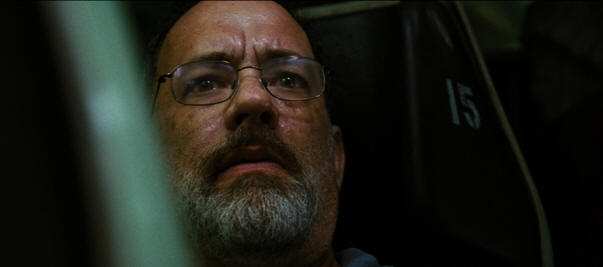MOVIE REVIEWS |
INTERVIEWS |
YOUTUBE |
NEWS
|
EDITORIALS | EVENTS |
AUDIO |
ESSAYS |
ARCHIVES |
CONTACT
|
PHOTOS |
COMING SOON|
EXAMINER.COM FILM ARTICLES
||HOME


Monday, October 21, 2013
MOVIE REVIEW Captain
Phillips
Boxed In By American Imperialism And Its Results

Tom Hanks in the title role in Paul Greengrass's docudrama "Captain Phillips".
Sony/Columbia Pictures
by
Omar P.L. Moore/PopcornReel.com
 FOLLOW
FOLLOW
Monday,
October 21,
2013
Pulsating with tension and agonizing, prolonged suspense, "Captain Phillips" is
an extremely nerve-wracking experience. Directed by Paul Greengrass in
docudrama style, the film is based on the true story documented by Captain
Richard Phillips in his book on the April 2009 Somali pirate hijack of his
Maersk Alabama freight vessel off African waters.
Tom Hanks commands the screen as the flawed, complex title figure, who may be as
exhausted by the implications of American imperialism and global branding as
Muse (Barkhad
Abdi), his adversary from Somalia is. Muse (pronounced Moo-see)
and his crew members dash out to sea in their small wooden boat to intercept the
gargantuan crates of million-dollar merchandise and goods being hauled to
Mombasa. The specter is pure David and Goliath, as Muse and company go up
against a behemoth of money, privilege and capitalism. Muse, a fisherman,
has found a big fish to reel in.
There's no "good" or "bad" guy in "Captain Phillips". Mr. Greengrass, a
director with a documentary and docudrama filmmaking background ("Bloody Sunday"),
pours humanity and empathy into his film and each character, which is what makes
"Captain Phillips" so arresting. Phillips arguably puts his own crew in
jeopardy and later abandonment. Muse, a dedicated, insistent fighter for
his cause, underlined by an excellent, charismatic performance by Mr. Abdi in
his maiden acting turn, wants to literally and metaphorically own a piece
of America if not by land then by sea. Muse spouts lines you expect to
hear in American action movies. "I am the captain now." He's no
doubt seen plenty of action films.
"Captain Phillips" is a psychological action film. Mr. Greengrass invests
in high stakes chess and stealthy, suspenseful moves that pay dividends in ways
big and small. As always the director skillfully prepares his battlefield,
previewing both sides of a fragile dividing line between his protagonists and
antagonists as he did in films like
"United 93". He captures brotherhoods,
alliances and an overall test of wills in such claustrophobic and limited
environments that add to the heat and urgency of the drama that arises.
Throughout, the griminess and brooding are a slow burn yielding to a plaintive
wail by a character late on. The scream is a primal yelp of trauma, relief
and horror. It's a scream we as an audience have wanted to scream for over
two hours.
Mr. Hanks internalizes his conflicts, guilt and survival instincts in a
revelatory performance that solidifies the range of his work. I don't
think "Captain Phillips" represents Mr. Hanks's best work but it is an impressive
depiction of a character who has lost belief in what his mission and
purpose is. Phillips has to find a new way to navigate himself if
not his juggernaut ship, and this is the intriguing journey "Captain Phillips"
becomes. We labor with Phillips for as long as we are able, and sometimes, being
as close as we are to him, the endurance is unbearable. Meanwhile Muse has
a deep love-hate relationship with America, and you can't help but feel for him,
and feel that he trusts in what America has to offer even as it has left its
unwelcome footprint on the African continent much to his chagrin.
My one criticism of "Captain Phillips" comes in its look at Muse's crew,
specifically one member, a maniacal sort whose eyes are fixed in a permanent
state of bug-eyed fury. It's the kind of caricatured cardboard invention
that gives way to charges of racial insensitivity and demonizing, not unlike the
racist portrayals of Somalis in Ridley Scott's jingoistic "Black Hawk Down",
also based on a true story. Why is there a need to demonize when you can
simply
just tell your story? Mr. Greengrass makes this ill-advised mistake with this
lone character. While the Somali pirates of 2009 weren't choirboys they
were human. Though the director understands this with Muse and one cohort
he doesn't quite bring that comprehension full circle, and that undercuts
the humanity and cohesion he shows elsewhere.
The tone and urgency of conversation shifts a lot in "Captain Phillips" and it
is a
marvel to hear the emotional range of dialogue between and amongst these
men. The frenzy, panic, calm, pleading and confidence, all demonstrated in
varied pitches, cadences and inflections. These speech rhythms are
constant, a soundtrack of their own. Some of these speech patterns will be
underlined by fear, mistrust and vengeance. Billy Ray expertly crafts a
taut script, calibrating frantic, guttural exchanges perfectly. On a visual level Mr. Greengrass uses space, intimacy, language barriers and perspective well,
sustaining a visceral and powerful atmospheric pull we can't escape.
Overall, "Captain Phillips" is an unrelenting ordeal, a cinematic triumph that
can't be denied.
Also with: Barkhad Abdirahman, Mahat Ali, Faysal Ahmed, Chris Mulkey, David
Warshofsky, Michael Chernus, Corey Johnson, Yul Vazquez, Catherine Keener.
"Captain Phillips" is rated PG-13 by the Motion Picture Association Of America
for sustained intense sequences of menace, some violence with bloody images, and
for substance abuse.
The film's running time is two hours and 14 minutes.
COPYRIGHT 2013. POPCORNREEL.COM. ALL RIGHTS RESERVED.  FOLLOW
FOLLOW
MOVIE REVIEWS |
INTERVIEWS |
YOUTUBE |
NEWS
|
EDITORIALS | EVENTS |
AUDIO |
ESSAYS |
ARCHIVES |
CONTACT
| PHOTOS |
COMING SOON|
EXAMINER.COM FILM ARTICLES
||HOME


 FOLLOW
TWEET
FOLLOW
TWEET FOLLOW
FOLLOW